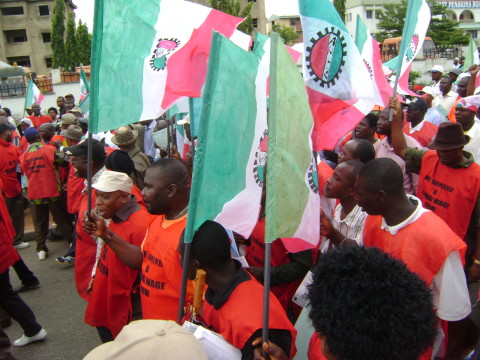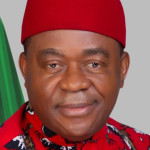Features – Workers’ Day: Nigerian Workers In Search Of Social Justice
Articles/Opinion, Featured, Latest Headlines Friday, May 3rd, 2024
(AFRICAN EXAMINER) – Every May 1 is celebrated as the International Workers’ Day or Labour Day in some countries. The day, also referred to as May Day, is dedicated to the recognition of the role of workers in societal development all over the world.
The International Labour Organization (ILO) said every May 1, it recommits to its mission of promoting jobs and protecting people
As the only tripartite UN agency, ILO said it is devoted to promoting social justice and internationally-recognised human and labour rights, pursuing its founding mission that social justice is essential to universal and lasting peace.
The ILO brings together governments, employers and workers representatives of 187 Member States, to set labour standards, develop policies and devise programmes promoting decent work for all women and men.
The organisation said on its website that productive employment and decent work are key elements to achieving fair globalisation and poverty reduction.
To this end, it developed The Decent Work Agenda, with four key pillars – employment creation, social protection, rights at work, and social dialogue.
It said it developed the agenda “for the community of work looking at job creation, rights at work, social protection and social dialogue, with gender equality as a crosscutting objective”.
The ILO also said the 2024 commemoration of Workers Day heightens the urgency for a renewed commitment to social justice.
“The day has a sense of urgency for renewed commitment to social justice, as we navigate through the complexities of our time, including climate change and the rapid evolution of the workplace due to technological advancements.
“These challenges have not only tested our resilience but have also underscored the indispensability of concerted efforts and solidarity in promoting the welfare of workers across all sectors,” it said.
At the regional level, the African Regional Organisation of the International Trade Union Confederation (ITUC-Africa), shared a similar message with the ILO, advocating a renewed call for jobs, peace, and democracy for shared prosperity.
The ITUC-Africa decried inadequate job creation in Africa, which it said exacerbates the plight of Africa’s youth, who face disproportionately high levels of unemployment and underemployment.
“The continent’s burgeoning youth population, projected to double by 2045, demands immediate attention to avoid exacerbating poverty and social inequalities.
“Therefore, it is pertinent that we re-echo the voices and concerns of our members across the continent and draw the attention of the continent’s critical stakeholders to some pragmatic alternatives to fix the issues,” it said.
To mark this year’s event, the ITUC-Africa, therefore, made eight demands on African governments for urgent and genuine consideration.
They include investment in education, skills training, and social protection to enhance employability and ensure a skilled workforce; and the development and implementation of imaginative policies and programmes that address gender disparities in the labour market.
Also, it demanded recommitment to the ideals of responsible governance and combatting corruption through the development and enforcement of the practice of the rule of law; and engineering a people-centred security architecture based on investment in people and communities, among others.
In Nigeria, May Day is being celebrated across the country amidst biting cost of living crisis, unbearable food inflation, multiple taxation, tariff hikes and the scarcity of petroleum products on which subsidies were said to have been removed.
The removal of fuel subsidy and the floating of the naira announced by President Bola Tinubu in his inauguration speech on May 29, 2023, sparked inflation and a high cost of living.
To cushion the sufferings of citizens amidst such economic reforms, the government announced various palliative measures.
For Nigerian workers, only a living wage can duly sustain them in the current state of the Nigerian economy.
They argue that the current minimum wage, contained in the 2019 Minimum Wage Act, remains pegged at N30,000 per month despite the dwindling purchasing power.
According to data from the National Bureau of Statistics (NBS), the inflation rate in Nigeria was 18.3 per cent in January 2024, the highest in over a decade.
The exchange rate of the Naira to the Dollar was N1,400 in February 2024, a 56 per cent depreciation from N900 in October 2023, when a N200,000 minimum wage was proposed.
Judging by the messages being passed to commemorate this year’s event, political officeholders seem to clearly understand what Nigerian workers desire the most in the context of prevailing circumstances.
President of the Nigerian Senate, Godswill Akpabio, used the opportunity to assure Nigerian workers that the National Assembly and the Executive would work together to give them a living wage.
Akpabio, also assured that the National Assembly under his leadership was more than committed to ensuring the best working conditions for the workers.
“No Nigerian worker will again be allowed to work under inhuman conditions, we will do everything to give you the best because you deserve the best,” he said.
Gov. Godwin Obaseki of Edo, who recently announced a N70,000 minimum wage for workers in the state, said the 75 per cent increment reflects how much his administration values workers.
On his part, Gov. Francis Nwifuru of Ebonyi said that his administration has taken a number of steps to improve the welfare of workers and urged them to reciprocate.
He also assured of the commitment of his administration to the prompt payment of salaries and other entitlements of workers.
As negotiations continue with organised labour on a new minimum wage, the latest demand from the Nigeria Labour Congress (NLC) and the Trade Union Congress (TUC) is N615,000 as the new minimum wage.
In her message to commemorate May Day, the Minister of State for Labour, Hon. Nkeiruka Onyejeocha, said workers will not lose anything as the new minimum wage will take effect from May 1, 2024.
She said it was regrettable that the new national minimum wage was not ready before this year’s Workers’ Day, but that a wide consultation was ongoing to ensure that the document is as soon as possible.
Her message that the Tripartite Committee on National Minimum Wage was yet to conclude its negotiations nullifies earlier speculations that the government had approved an increase of between 25 per cent and 35 per cent in salaries of civil servants.
The question now is, will Nigerian workers get what they deserve? Only time will tell.
By Kayode Adebiyi, News Agency of Nigeria (NAN)
Related Posts
Short URL: https://www.africanexaminer.com/?p=95484






















